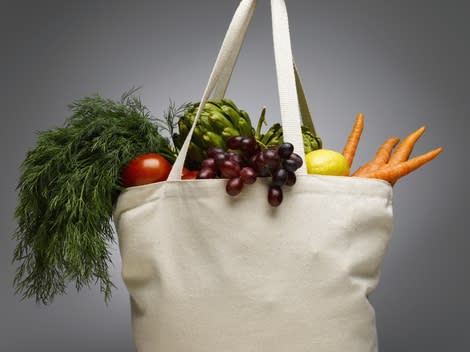7 Fake Foods You Didn't Know You Were Eating

Food fraud is a booming enterprise in which adulterated foods or mislabeled foods--which by some estimates make up close to 7 percent of our food supply--slip undetected into the U.S.
Some experts estimate the food fraud industry to be worth billions a year. And it isn't confined to adding illegal substances to a food; the crime encompasses any deliberate substitution, addition, tampering, or misrepresentation of food, ingredients, or packaging. (Certain additions can make foods even healthier. Try these 9 Superfood Pairings.)
While it is impossible to know exactly how much counterfeit fare we scoop onto our plates every day, a recent report in the Journal of Food Science, which analyzed published records of food fraud from 1980 to 2010, found that in 95 percent of the fakeries, authentic material--for example, extra-virgin olive oil--was swapped for a less expensive substitute, such as palm or peanut oil. (Worried that you're not getting the nutrients you need? Check out the 18 Best Supplements for Women.)
It's a bummer to think that the fancy gourmet coffee you think you've been buying--at a premium!--from your local market or ordering at your favorite cafe may actually be some conventional variety. But consider yourself lucky if your budget is all that ends up being compromised. For someone with a severe nut allergy who unwittingly sautés spinach in olive oil that has been cut with peanut oil, the dupe is downright dangerous, if not deadly.
While experts say there's no way to know for sure that what you buy is exactly what it says it is--barring some fancy and expensive testing--these tips will help reduce your risk of ingesting adulterated food.
Avoid deals that seem too good. There's no need to buy the priciest olive oil you can find, but no authentic EVOO costs $3 a gallon. "If you buy the very cheapest product around, you will not get the highest quality," says Markus Lipp, Ph.D., director of food standards at the U.S. Pharmacopeial Convention, a scientific nonprofit that sets food ingredient standards for the FDA. (Tired of olive oil? 4 Alternative Cooking Oils You Need to Try.)
Buy name brands. "If you're buying from a reputable company that has a brand"--including a generic or store brand--"they have a vested interest in maintaining that brand, so you can be pretty sure they are doing what they can, in terms of verifying their supply chains and testing and getting products that aren't adulterated," says Karen Everstine, research fellow at the National Center for Food Protection and Defense. "They don't want to ruin their reputation."
Look at food labels and lot numbers. Seals like the USDA organic certification and those of trade groups like True Source Honey and the North American Olive Oil Association aren't 100 percent foolproof, but they're a good sign someone has checked the product, says John Spink, Ph.D., the associate director of Michigan State University's Anti-Counterfeiting and Product Protection Program. And lot numbers--printed black numbers on the side or bottom of the packaging--indicate a quality-control system is in place.
Buy local. It's all about shortening the supply chain and increasing transparency. If you're buying produce from the person who grew it or meat from the person who raised it, there are fewer opportunities for the food to be tampered with than tomatoes that have been shipped halfway around the world and handled by multiple people. (Pick up some sweet potatoes at the farmer's market, then try one of these 10 ridiculously goodSweet Potato Recipes.)
The 7 Phoniest of Them All
An analysis of more than 1,300 reported incidents collected by the Food Fraud Database from 1980 through 2010 revealed the seven most fraud-prone ingredients.
1. Olive Oil
Adulteration: Regular olive oil instead of extra virgin; soybean oil colored with chlorophyll; hazelnut, corn, sunflower, peanut, vegetable, palm, and walnut oils
2. Milk
Adulteration: Reconstituted milk powder, urea, and rennet; oil, urea, detergent, caustic soda, sugar, salt, and skim milk powder; melamine
3. Honey
Adulteration: Sugar syrup, corn syrup, fructose, glucose, high-fructose corn syrup, beet sugar, antibiotics
4. Saffron
Adulteration: Glycerin, sandalwood dust, tartrazine (a yellow dye linked to hyperactivity in children), barium sulfate (a compound used in oil-well drilling), borax
5. Orange Juice
Adulteration: Fungicide, lemon juice, mandarin juice, grapefruit juice, high-fructose corn syrup, paprika extract, beet sugar
6. Coffee
Adulteration: Twigs, roasted corn, ground roasted barley, ground parchment. Instant coffee: chicory, cereals, caramel, parchment, starch, malt, figs
7. Apple Juice
Adulteration: High-fructose corn syrup, raisin sweetener, synthetic malic acid
This story originally appeared as Healthy Shopping: Avoid Food Fraud on Women's Health.
--By Gretchen Voss, Women's Health
More from Women's Health:
The 125 Best Packaged Foods for Women
How to Understand Food Labels
Is Going Gluten-Free Worth It?
